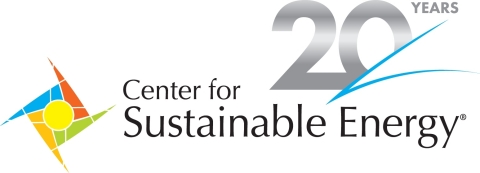SAN DIEGO--(BUSINESS WIRE)--In order to make clean vehicles more accessible to a greater number of California drivers, especially in communities that are highly impacted by air pollution, the Clean Vehicle Rebate Project (CVRP) is implementing increased incentive levels for lower-income consumers and new high-income eligibility caps. Following a public workshop held Sept. 30, the California Air Resources Board (ARB) issued the program updates, as directed by the legislative Budget Act of 2016 and Senate Bill 859 (Wolk). They will apply statewide to consumers who purchase or lease rebate-eligible vehicles effective Nov. 1, 2016, providing lower-income consumers an additional $500.
Since 2010, CVRP has issued over $335 million in rebates for more than 157,300 vehicles, according to the Center for Sustainable Energy (CSE), which administers the ARB program. Rebates vary by vehicle type. For the average consumer, they are $2,500 for battery electric vehicles (BEVs), $1,500 for plug-in hybrid electric vehicles (PHEVs) and $5,000 for fuel cell vehicles.
For lower-income consumers, CVRP rebates for all types of eligible light-duty passenger vehicles are increasing by an additional $500 for a total of $2,000 more per rebate ($4,500 for BEVs, $3,500 for PHEVs, and $7,000 for fuel cell vehicles). When combined with the maximum federal tax credit for eligible vehicles, the increased rebates provide savings of up to $12,000 for BEVs, $11,000 for PHEVs and $15,000 for fuel cell vehicles. To qualify for the increased rebates, applicants must have household incomes less than or equal to 300 percent of the federal poverty level. For an individual, the gross annual income limit is $35,640, and for a household of four, it is $72,900.
Higher income consumers will not be eligible for CVRP rebates if their gross annual income exceeds $150,000 for single tax filers, $204,000 for head of household filers and $300,000 for joint filers. Income levels will be determined by the amount reported on the applicant’s federal tax return. The caps do not apply to fuel-cell electric vehicles, which represent less than 1 percent of CVRP’s applications.
Another change to the CVRP rebates is that plug-in hybrid electric vehicles with an electric range of less than 20 miles will no longer qualify for the program. Rebates for zero-emission motorcycles will remain at $900.
Additional clean vehicle incentives based on income eligibility are available in disadvantaged communities in the South Coast Air Quality Management District and the San Joaquin Valley Air Pollution Control District. ARB’s Drive Clean website offers a guide for clean vehicle incentives at DriveClean.CA.gov.
For further information on the CVRP, a list of eligible vehicles and rebates, and complete application procedures, visit CleanVehicleRebate.org.
The CVRP and incentives are part of the California Climate Investments, which uses proceeds from the State’s cap-and-trade auctions to reduce greenhouse gas emissions while providing a variety of additional benefits to California communities.
About the Center for Sustainable Energy®
Accelerating the transition to a sustainable world powered by clean energy.
Founded in 1996, the Center for Sustainable Energy (CSE) is a mission-driven nonprofit dedicated to developing a clean energy future that addresses climate change, increases energy independence and generates lasting economic and environmental benefits. CSE is helping to create this opportunity through its expertise in clean transportation, distributed energy resources, energy efficiency, energy engineering, and regulatory and policy support. Positioned as a trusted advisor, CSE partners with clients of all sizes to accelerate achievement of their sustainability objectives through a suite of energy services that include comprehensive program design and management, research and analysis, technical advising, incentive and rebate management, and education and outreach. CSE is headquartered in San Diego with offices in Boston, Los Angeles and Oakland, Calif. Learn more at EnergyCenter.org - Facebook - Twitter - LinkedIn.





